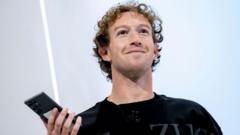As conservative critiques of diversity programs intensify, Meta and Amazon are among the companies pulling back on diversity, equity, and inclusion (DEI) efforts previously bolstered by the Black Lives Matter movement.
Meta and Amazon Halt Diversity Programs Amid Corporate Backlash

Meta and Amazon Halt Diversity Programs Amid Corporate Backlash
Leading tech giants Meta and Amazon scale back diversity initiatives, aligning with a wider trend of corporate America reassessing DEI commitments.
In a notable shift reflecting changing political and legal climates, Meta Platforms, the parent company of Facebook, Instagram, and WhatsApp, has announced the cessation of its diversity programs. This decision follows a similar trend within corporate America as firms rollback DEI initiatives amid increasing conservative scrutiny. Notably, Meta's change follows its recent announcement of terminating a fact-checking initiative that was criticized by former President Donald Trump.
In a memo to employees, which Axios was the first to report and was later confirmed by the BBC, Meta cited a "shifting legal and policy landscape." The company referenced Supreme Court rulings pertaining to race-based admissions in education, claiming the term "DEI" has become "charged" in current American discourse. While Meta expressed an ongoing commitment to seek out diverse talent, it will no longer focus on selecting candidates from minority groups specifically. Instead, it aims to prioritize the hiring of small and medium-sized businesses over those defined as "diverse."
Amazon is likewise winding down its DEI programs. In a memo by Candi Castleberry, Amazon's VP of inclusive experiences and technology, the company aims to complete the process by the end of 2024. Castleberry highlighted the strategy to consolidate proven programs rather than allowing individual groups to create initiatives, emphasizing an authentic inclusive culture.
Corporate giants like Walmart and McDonald's have similarly reduced or eliminated their diversity programs. This retreat began about two years ago, coinciding with increasing criticism from Republican leaders against firms seen as overly progressive. Consequently, Bud Light and Target confronted backlash regarding their campaigns aimed at LGBTQ communities.
The societal shift away from many of these DEI initiatives stems from the aftermath of the 2020 protests sparked by George Floyd's tragic death. Recent judicial decisions have supported arguments against such diversity initiatives, with the Supreme Court limiting considerations of race in educational admissions and invalidating a Nasdaq policy demanding diversity on corporate boards.
The announcement from Meta, which has also streamlined its supplier initiatives and eliminated equity and inclusion training, has evoked contrasting reactions from various spokespersons. Conservative activist Robby Starbuck hailed the decision, while the Human Rights Campaign warned that abandoning these initiatives undermines long-term corporate responsibility.
Moreover, Meta CEO Mark Zuckerberg recently addressed the complexities of content moderation decisions in a candid interview, expressing his newfound clarity in policy direction amidst the polarized landscape affecting the U.S. tech sector.
As these corporations navigate a landscape rife with political and social tensions, their decisions on diversity programs will continue to draw scrutiny and debate.
In a memo to employees, which Axios was the first to report and was later confirmed by the BBC, Meta cited a "shifting legal and policy landscape." The company referenced Supreme Court rulings pertaining to race-based admissions in education, claiming the term "DEI" has become "charged" in current American discourse. While Meta expressed an ongoing commitment to seek out diverse talent, it will no longer focus on selecting candidates from minority groups specifically. Instead, it aims to prioritize the hiring of small and medium-sized businesses over those defined as "diverse."
Amazon is likewise winding down its DEI programs. In a memo by Candi Castleberry, Amazon's VP of inclusive experiences and technology, the company aims to complete the process by the end of 2024. Castleberry highlighted the strategy to consolidate proven programs rather than allowing individual groups to create initiatives, emphasizing an authentic inclusive culture.
Corporate giants like Walmart and McDonald's have similarly reduced or eliminated their diversity programs. This retreat began about two years ago, coinciding with increasing criticism from Republican leaders against firms seen as overly progressive. Consequently, Bud Light and Target confronted backlash regarding their campaigns aimed at LGBTQ communities.
The societal shift away from many of these DEI initiatives stems from the aftermath of the 2020 protests sparked by George Floyd's tragic death. Recent judicial decisions have supported arguments against such diversity initiatives, with the Supreme Court limiting considerations of race in educational admissions and invalidating a Nasdaq policy demanding diversity on corporate boards.
The announcement from Meta, which has also streamlined its supplier initiatives and eliminated equity and inclusion training, has evoked contrasting reactions from various spokespersons. Conservative activist Robby Starbuck hailed the decision, while the Human Rights Campaign warned that abandoning these initiatives undermines long-term corporate responsibility.
Moreover, Meta CEO Mark Zuckerberg recently addressed the complexities of content moderation decisions in a candid interview, expressing his newfound clarity in policy direction amidst the polarized landscape affecting the U.S. tech sector.
As these corporations navigate a landscape rife with political and social tensions, their decisions on diversity programs will continue to draw scrutiny and debate.





















